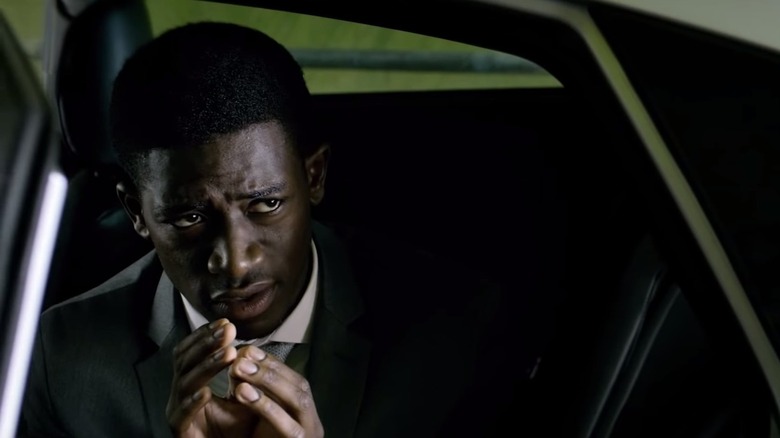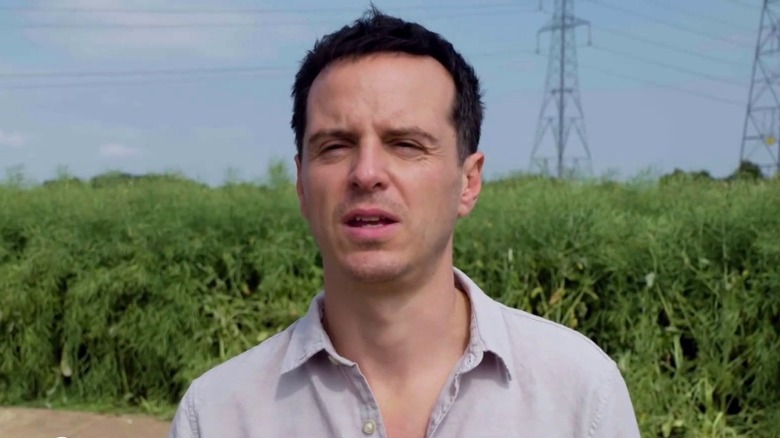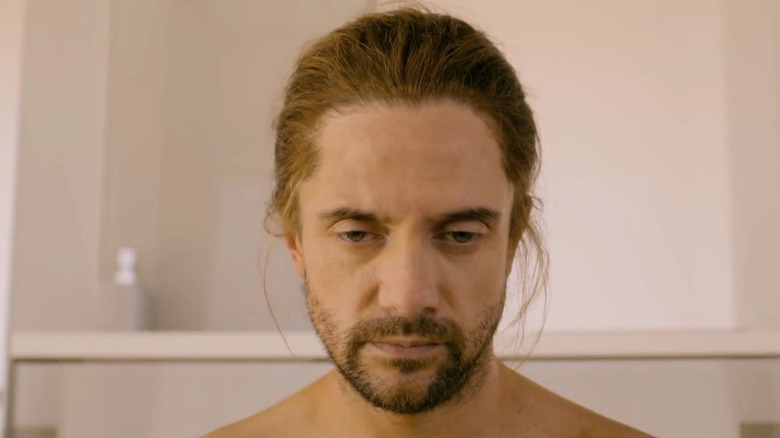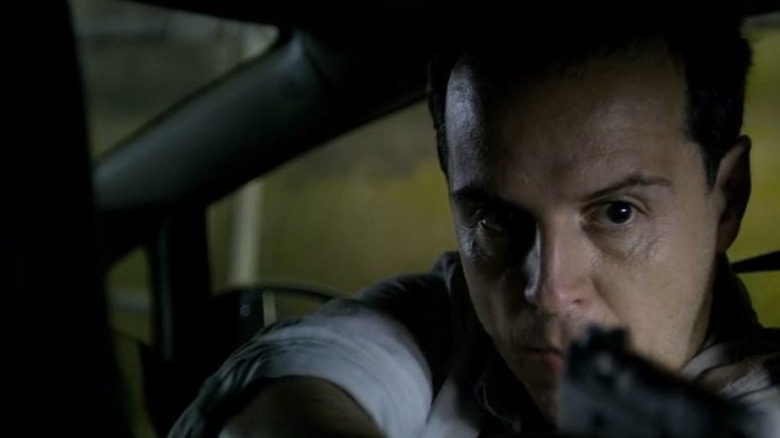How A Lost Uber Driver Inspired Black Mirror's Smithereens
Despite being a science fiction series, "Black Mirror" is heavily based on our evolving relationship with technology and the digital world, so it's no surprise that the show's creator Charlie Brooker finds plenty of sources of inspiration in daily life. Many menial aspects of the contemporary world can spark a creative revelation and inspire one of the new, demented worlds of "Black Mirror." One such banality was an Uber ride gone wrong that Brooker took one evening, which birthed the idea for the 2019 episode "Smithereens."
Much of our daily interaction is filtered through our phones. Whether it be a date you met on Hinge or a restaurant you read about on Yelp, the digital world acting as a vetting process for the outside world provides a false sense of security. Surely someone whose name is attached to a social media profile wouldn't do something that could get them reported, right? It is almost the same kind of security that we feel from behind the screen, out of reach from physical harm by the people we interact with online.
This inherent trust is what inspired the gut-wrenching season 5 episode about a technophobic rideshare driver. The episode's anti-hero is nearly flung into a rage with every ding, buzz, and beep he hears. He hatches a plan to take a hostage from a popular social media company and demands to speak to his boss. His carefully-crafted scheme quickly starts to unravel, and a "Dog Day Afternoon" scenario ensues.
Suddenly, Brooker was wondering where he was
Brooker was on an Uber ride of his own when he thought of the idea for "Smithereens." The series creator was fascinated by how easily a driver could put a rider in harm's way, and vice versa. Even though the large corporate overhead makes the rider feel secure, there's no supervision in that car, and anything could happen.
"The story came from two things," Brooker told the Independent. "The first was regarding the trust you put in someone when you get in the back of an Uber. I had an experience where I got in the back of the car and I was on my phone. Suddenly, I was wondering where I was. The guy got out and was rummaging through stuff in the boot [trunk, for our American readers]. I was wondering 'What is going on?' It turns out he was just getting a bottle of water out and didn't want to interrupt me."
The writer-director made out okay, but his characters weren't quite so lucky. The unlucky hostage in "Smithereens" also has his eyes glued to his phone and doesn't notice his driver cancel the ride and take him far off-route. The hapless intern doesn't even look up until he is in the middle of nowhere being threatened at gunpoint.
"People don't even look up anymore," his captor laments, chastising him for his excessive phone use. "The sky could turn f***ing purple and you c***s wouldn't notice for a moment. You didn't look up, and look where that got you. Sitting in the back like that."
The series creator was, ironically, distracted by his phone
The terrifying blind trust of Uber rides is facilitated entirely by the digital world, which is designed to keep the user in a state of mind-numbing chronic consumption. The cinematography of this episode reflects this social detachment by shooting largely through mirrors, scopes, and windows. The unhinged driver and his foil, the all-powerful tech mogul, are both seen for the first time — and recurrently — through panes of glass.
A running theme in "Black Mirror" is the addictive nature of technology, but "Smithereens" removes some of the series' more thinly-veiled symbolism. The app names might be changed, but this scenario could happen almost identically in the world we live in. Phone distraction is already a significant cause of car accidents, fatal and otherwise, just as it was in the episode.
"The phone is meant to keep you there," explained series producer Annabel Jones. "It's very interesting how subtly and incrementally the ingredients have changed. Take your email. A little number appears on your homepage showing you how many emails you have not opened. You now need to check those new emails. It's the gamification of that. Nobody tells you these changes are happening."
To offset the growing problem of phone and social media addiction, some tech companies have implemented measures intended to help moderate screentime, like Apple's app-based time limits or TikTok's eerie "stop scrolling" videos that urge users to prioritize food and water over further entertainment, suggesting our phones instruct us to perform basic human functions before our brain does.
"We're in an ironic situation now where the phones designed to absorb you are telling you, 'You're using me too much,'" Jones pointed out. "It's not common sense telling you — it's the phone."
Smithereens isn't a cautionary tale
Despite the ominous feeling left in the pit of the viewer's stomach after watching "Black Mirror," Brooker insists that his show is not a series of moral tales. The running theme of technology serves only as a vehicle of story and is not intended to frighten the audience into chucking their phone off a bridge.
"Our stories are not warnings," the series creator claimed. "Technological progress is completely inevitable. We think more about the human characters. They're not societal warnings. And I think we're quite optimistic."
"Black Mirror" itself is now hosted on a streaming platform — the one that started it all, in fact. The show has even done a meta-commentary on the subject called "Streamberry," and Netflix was surprisingly cool about it. Brooker is not as fatalistic about social media as his viewers might think. Instead, he recognizes its potential to elevate dissident voices — some for the better of society, and others perhaps for the worse. His narratives do just what the technology itself does: reveal true elements of human nature through a digital lens.
"We're in that period of finding out what's in people's heads," the series creator said, likening these early days of social media to the early days of the printing press. "You get extremes being presented, but I think the world feels more polarised than it actually is."
Whether it was something very sinister or something very banal that kept Brooker's eyes glued to his phone during that fateful Uber ride, it gave us one of the best "Black Mirror" episodes of all time.



